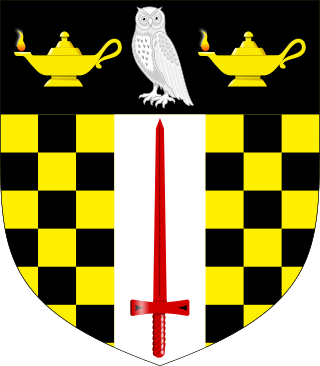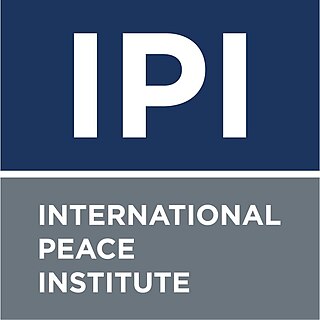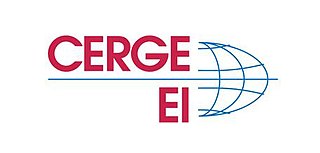
Brighton is a seaside resort and one of the two main areas of the city of Brighton and Hove in the county of East Sussex, England. It is located 47 miles (76 km) south of London. Archaeological evidence of settlement in the area dates back to the Bronze Age, Roman and Anglo-Saxon periods. The ancient settlement of "Brighthelmstone" was documented in the Domesday Book (1086). The town's importance grew in the Middle Ages as the Old Town developed, but it languished in the early modern period, affected by foreign attacks, storms, a suffering economy and a declining population. Brighton began to attract more visitors following improved road transport to London and becoming a boarding point for boats travelling to France. The town also developed in popularity as a health resort for sea bathing as a purported cure for illnesses.

The Royal Society for the Encouragement of Arts, Manufactures and Commerce, commonly known as the Royal Society of Arts (RSA), is a London-based organisation.

Trinity College Dublin, officially titled The College of the Holy and Undivided Trinity of Queen Elizabeth near Dublin, is the sole constituent college of the University of Dublin, Ireland. Founded in 1592 by Queen Elizabeth I who issued a royal charter on the advice of the Lord Chancellor of Ireland Adam Loftus, it is Ireland's oldest university and was modelled after the collegiate universities of both Oxford and Cambridge, with whom it shares a symbiotic history. The epithets "Trinity College Dublin" and "University of Dublin" are usually considered as synonyms, as only one such college was ever established in Ireland.

Eastern Michigan University is a public research university in Ypsilanti, Michigan, United States. Founded in 1849 as the Michigan State Normal School, it was the fourth normal school established in the United States and the first outside New England. In 1899, the Michigan State Normal School became the first normal school in the nation to offer a four-year curriculum; the college became a university in 1959.

The University of Western Ontario is a public research university in London, Ontario, Canada. The main campus is located on 455 hectares of land, surrounded by residential neighbourhoods and the Thames River bisecting the campus's eastern portion. The university operates twelve academic faculties and schools.

The Rockefeller Foundation is an American private foundation and philanthropic medical research and arts funding organization based at 420 Fifth Avenue, New York City. The foundation was created by Standard Oil magnate John D. Rockefeller ("Senior") and son "Junior", and their primary business advisor, Frederick Taylor Gates, on May 14, 1913, when its charter was granted by New York. It is the second-oldest major philanthropic institution in America and ranks as the 30th largest foundation globally by endowment, with assets of over $6.3 billion in 2022.

Birkenhead is a town in the Metropolitan Borough of Wirral, Merseyside, England; It was part of Cheshire until 1974. The town is on the Wirral Peninsula, along the west bank of the River Mersey, opposite Liverpool. At the 2011 census, it had a population of 88,818.

Bishop's Stortford is a historic market town and civil parish in the East Hertfordshire district, in the county of Hertfordshire, England. It is in the London commuter belt, near the border with Essex, just west of the M11 motorway and Stansted Airport, 22 miles north-east of Central London and 34 minutes away by rail from Liverpool Street station. The town had an estimated population of 41,088 in 2020. The district of East Hertfordshire, where the town centre is located, was ranked as the best place to live in the UK by the Halifax Quality of Life annual survey in 2020.

The Royal Geographical Society (with the Institute of British Geographers), often shortened to RGS, is a learned society and professional body for geography based in the United Kingdom. Founded in 1830 for the advancement of geographical sciences, the society has 16,000 members, with its work reaching the public through publications, research groups and lectures.

A living wage is defined as the minimum income necessary for a worker to meet their basic needs. This is not the same as a subsistence wage, which refers to a biological minimum, or a solidarity wage, which refers to a minimum wage tracking labor productivity. Needs are defined to include food, housing, and other essential needs such as clothing. The goal of a living wage is to allow a worker to afford a basic but decent standard of living through employment without government subsidies. Due to the flexible nature of the term "needs", there is not one universally accepted measure of what a living wage is and as such it varies by location and household type. A related concept is that of a family wage – one sufficient to not only support oneself, but also to raise a family.

The University of Buckingham (UB) is a non-profit private university in Buckingham, England and the oldest of the country's six private universities. It was founded as the University College at Buckingham (UCB) in 1973, admitting its first students in 1976. It was granted university status by royal charter in 1983.

Birkbeck, University of London, is a public research university located in London, England, and a member institution of the University of London. Established in 1823 as the London Mechanics' Institute by its founder Joseph Clinton Robertson and its supporters Sir George Birkbeck, Jeremy Bentham, J. C. Hobhouse and Henry Brougham, Birkbeck is one of the few universities to specialise in evening higher education in the United Kingdom.

The School of Advanced International Studies (SAIS) is a graduate school of Johns Hopkins University based in Washington, D.C. The school also maintains campuses in Bologna, Italy and Nanjing, China.

Sutton is a town in the London Borough of Sutton in South London, England. It is the administrative headquarters of the Outer London borough, on the lower slopes of the North Downs. It is 10 miles (16 km) south-southwest of Charing Cross, one of the fourteen metropolitan centres in the London Plan.

The Peace Research Institute Oslo is a private research institution in peace and conflict studies, based in Oslo, Norway, with around 100 employees. It was founded in 1959 by a group of Norwegian researchers led by Johan Galtung, who was also the institute's first director (1959–1969). It publishes the Journal of Peace Research, also founded by Johan Galtung.

Albany Law School is a private law school in Albany, New York. It was founded in 1851 and is the oldest independent law school in the nation. It is accredited by the American Bar Association as well as the Middle States Commission on Higher Education and has an affiliation agreement with University at Albany that includes shared programs. The school is located near New York's highest court, federal courts, the executive branch, and the state legislature.
The Institute of Advanced Legal Studies (IALS) is a member institute of the School of Advanced Study, University of London. Founded in 1947, it is a national academic centre of excellence, serving the legal community and universities across the United Kingdom and the world through legal scholarship, facilities, and its comparative law library.

The International Peace Institute is an independent non-profit think tank founded in 1970 based in New York. The institute has a regional office in the Middle East and had a regional office in Europe until 2020.

The Center for Economic Research and Graduate Education – Economics Institute, known as CERGE-EI is an academic institution in Prague, Czech Republic, specialised in economics. The institute is a partnership between the Center for Economic Research and Graduate Education of Charles University and the Economics Institute of the Czech Academy of Sciences. It is also a New York State Education Department entity with a permanent charter for its degree-granting educational programs awarded by the New York State Board of Regents. It is located in the Schebek Palace in the center of Prague.

Sir Arthur "Richard" Jolly, is a development economist who served as Assistant Secretary-General of the United Nations from 1982 to 2000. He has been named one of the fifty key thinkers globally in developmental economics.


















